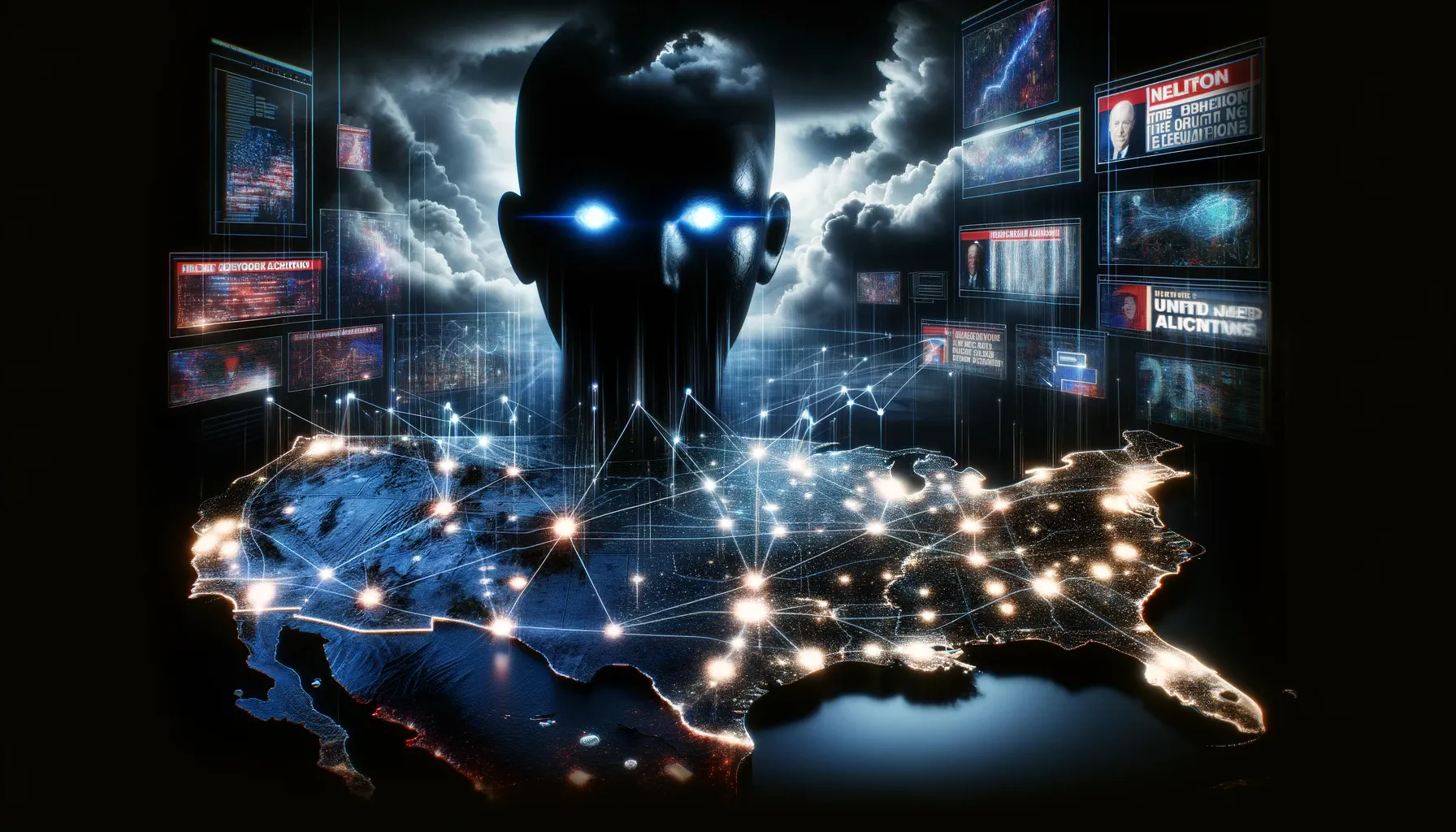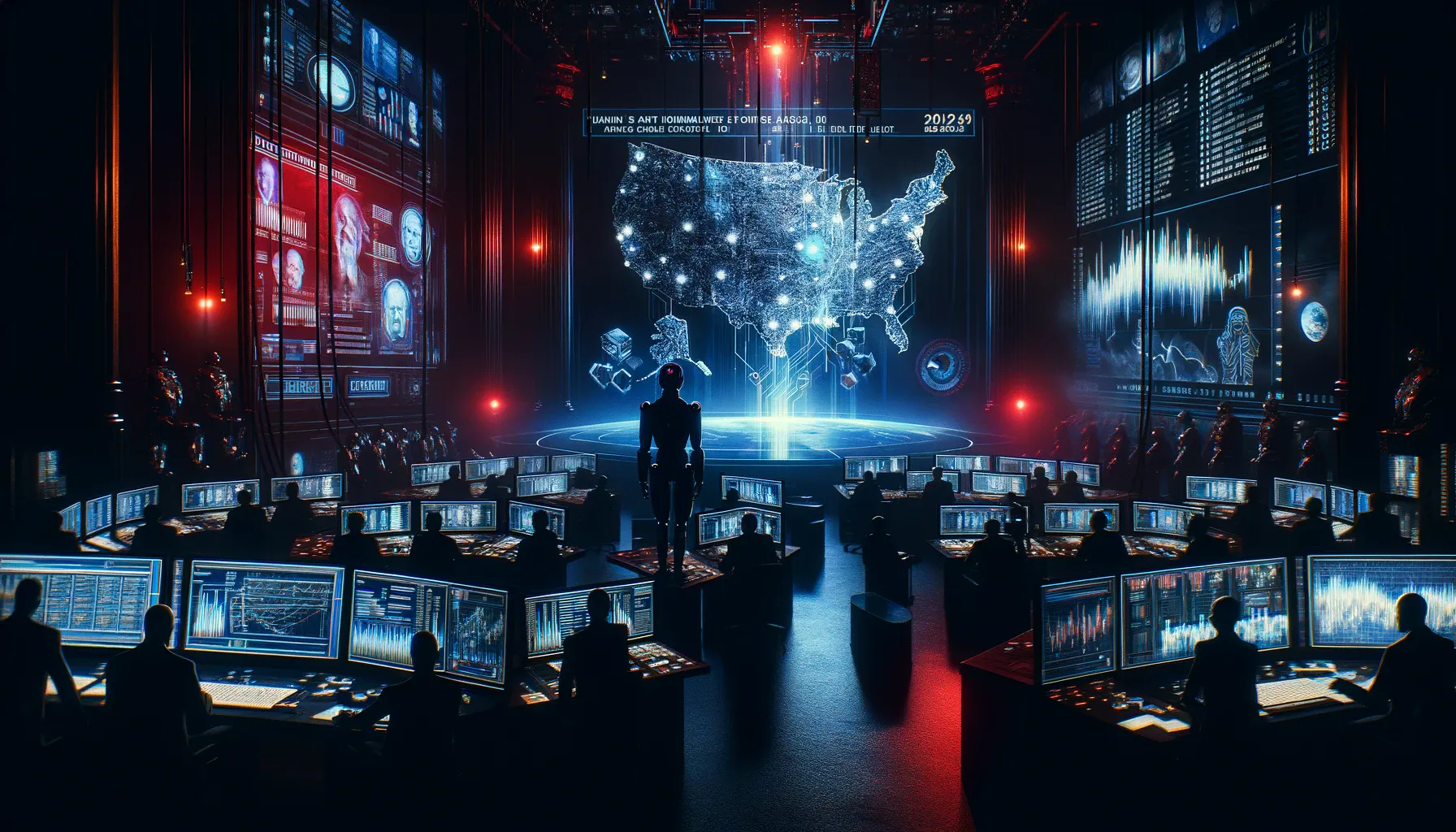Table of Contents
The 2024 US elections are right around the corner, and the political landscape is undergoing a profound transformation, thanks in no small part to the growing influence of artificial intelligence (AI). The intersection of Election AI Chaos 2024 is raising intriguing questions about the role technology plays in shaping the democratic process. In this article, we will examine the potential consequences of AI’s involvement in the 2024 US elections, exploring both the benefits and the challenges.
AI’s Impact on Elections
“Election AI Chaos 2024” refers to the growing concern and debate surrounding the impact of artificial intelligence (AI) on the 2024 elections. It represents the potential for AI to both contribute positively by improving various aspects of the electoral process and disrupt the landscape by raising questions about fairness, security, and manipulation. As the 2024 elections approach, it is crucial to carefully consider the implications of AI and its role in shaping the future of politics and democracy.
Campaign Strategy and Messaging: AI-driven tools will undoubtedly be a driving force in shaping campaign strategies during Election AI Chaos 2024. AI’s capacity to analyze vast amounts of data will allow campaigns to gain a deep understanding of voter sentiment, preferences, and behavior. This could result in more precise targeting of specific demographics with tailored messaging, optimizing the use of campaign resources.
However, this very capability also raises concerns about the ethics of data usage and privacy, as the controversial illustration of Cambridge Analytica demonstrated in previous elections. Striking a balance between effective campaigning and respecting voter privacy will be a critical challenge in 2024.

Voter Engagement: AI’s role in voter engagement is likely to expand significantly in the upcoming elections. Platforms like Brigade exemplify the potential of AI to connect voters with causes they care about, facilitating more extensive civic participation. We can anticipate the emergence of AI-driven chatbots, personalized voter outreach, and highly targeted social media campaigns. These innovations could enhance voter engagement by tailoring political information to individual interests. However, there must be transparency in how AI is used to avoid concerns about manipulation and bias, ensuring that voters receive accurate and unbiased information.
Deepfake and Misinformation: The specter of deepfake technology and misinformation looms ominously over Election AI Chaos 2024. While AI can be a powerful tool for detecting misinformation, it can also be harnessed to create convincing deepfake videos and generate fake news. This poses a significant threat to the integrity of the electoral process, as manipulated content can sway public opinion and sow discord. Addressing this challenge will require the development of robust AI-based tools for detecting and countering deepfakes and misinformation, as well as educating the public about the risks.
Election Security: AI will play a dual role in the context of election security during Election AI Chaos 2024. On one hand, it is an indispensable tool for safeguarding elections against cyber threats. Companies like CrowdStrike use AI to detect and prevent election interference, enhancing the resilience of electoral systems. However, this very same technology can be leveraged by malicious actors to devise new tactics for interference, making it a double-edged sword. Election officials and cybersecurity experts will need to stay one step ahead by continuously adapting and innovating to defend against evolving threats.
Companies Shaping AI in 2024 US Elections
In the context of Election AI Chaos 2024, several prominent companies and organizations are actively involved in shaping the role of artificial intelligence (AI) in the upcoming US elections:
OpenAI: OpenAI stands at the forefront of AI research and development, particularly in the field of natural language processing (NLP). Their innovations have significant implications for addressing the challenges of Election AI Chaos 2024. OpenAI’s GPT-3 model, similar to the one powering this article, can play a pivotal role in analyzing and summarizing vast amounts of text data related to the elections. This can aid in the detection of misinformation and the understanding of public sentiment, ultimately contributing to a more informed electorate.

Facebook: As a social media giant, Facebook wields immense influence in the realm of elections. With its extensive user data and sophisticated AI algorithms, the company has the power to both positively and negatively impact voter behavior and the spread of information. In light of concerns surrounding Election AI Chaos 2024, Facebook has implemented measures aimed at curbing the dissemination of misinformation and enhancing transparency regarding political advertisements. These efforts are crucial in mitigating the potential chaos related to election interference.
Microsoft: Microsoft, through its Defending Democracy Program, is actively engaged in protecting the integrity of democratic processes globally. AI plays a central role in their efforts, enabling the enhancement of election security, the detection of disinformation campaigns, and the safeguarding of election infrastructure. In the context of the 2024 US elections, Microsoft’s initiatives will be instrumental in preventing chaos stemming from election-related interference and security breaches.
Google: Google, with its dominant search algorithms and YouTube platform, holds a significant influence over public opinion during elections. Recognizing the need to combat misinformation and promote reliable information, the company has taken steps to encourage fact-checking and elevate authoritative sources in search results. In Election AI Chaos 2024, Google’s AI-driven algorithms will continue to shape the information landscape, emphasizing the importance of providing accurate and trustworthy information to voters.
Twitter: In the lead-up to the 2024 US elections, Twitter’s AI-driven initiatives, part of their ongoing efforts to combat fake accounts, disinformation campaigns, and election interference attempts, will play a critical role in maintaining a secure and informative environment for political discussions. Given the potential for chaos and misinformation surrounding elections, Twitter’s Election AI Chaos 2024 program will be pivotal in striking the right balance between preserving free speech and preventing the spread of harmful content on the platform. This program aims to ensure that Twitter remains a major platform for political discourse and engagement while safeguarding the integrity of the democratic process.

Challenges and Ethical Concerns in Election AI Chaos 2024
Election AI Chaos 2024 presents both opportunities and challenges in the electoral context. While AI has the potential to revolutionize campaigns and enhance voter engagement, it also introduces significant challenges and ethical concerns that need to be addressed.
Bias and Fairness: One of the key challenges in Election AI Chaos 2024 is the issue of bias and fairness. AI algorithms used in election campaigns can inherit biases from their training data. These biases can manifest in various ways, such as unfair targeting of specific voter groups. For instance, if the training data contains historical biases or prejudices, AI systems might inadvertently perpetuate these biases, leading to unfair campaign strategies. This can contribute to chaos and polarization within the electorate as certain groups are disproportionately targeted or ignored.
Privacy: Privacy is another critical concern in Election AI Chaos 2024. The extensive collection and utilization of voter data by AI-driven campaign strategies raise questions about individual privacy. The vast amount of personal information gathered can potentially be misused or mishandled, infringing on voters’ rights to privacy. Striking a balance between harnessing the power of data for effective campaigns and safeguarding individuals’ privacy rights is a significant ethical challenge that must be addressed.
Regulation and Oversight: The Election AI Chaos of 2024 underscored the critical need for robust regulation and oversight mechanisms in the use of AI in elections. The events of that year highlighted the potential for AI to be misused for unethical or manipulative purposes in campaign strategies. Ensuring fairness, transparency, and accountability in the electoral process became paramount as a result. Striking a delicate equilibrium between innovation and regulation became even more complex in the wake of this election, as it exposed vulnerabilities and challenges in managing AI’s role in politics.
In Election AI Chaos 2024, addressing these challenges and ethical concerns is essential to maintain the integrity of the electoral process, promote fair and transparent campaigns, and prevent the exacerbation of chaos and polarization in society. Effective regulation, unbiased training data, and responsible data handling are among the key measures that can help mitigate these concerns and harness the benefits of AI in elections while minimizing potential risks.

The Recipe for Chaos
The role of Election AI Chaos 2024 in the upcoming US elections is a critical concern. If not carefully managed, AI’s involvement in the electoral process could indeed become a recipe for chaos. The intersection of advanced technology and politics is a double-edged sword. On one hand, AI can help campaigns better understand voter preferences, target their messages effectively, and streamline operations. However, on the other hand, it can lead to the erosion of privacy, the spread of misinformation, and potentially skewed election outcomes. Therefore, measures must be put in place to harness the benefits of AI while mitigating the risks to ensure a fair and transparent electoral process in 2024.
Conclusion
As we approach the 2024 US elections, AI’s role in shaping the electoral landscape cannot be underestimated. From campaign strategy to voter engagement, AI has the potential to both enhance and disrupt the electoral process. Real-world companies and organizations are actively involved in harnessing AI for various purposes, from improving election security to addressing misinformation. However, this powerful tool comes with its share of challenges and ethical concerns.
One notable concern is the potential for Election AI Chaos in 2024. This term refers to the risks associated with the misuse or manipulation of AI in the electoral process, including issues such as deepfake videos, automated disinformation campaigns, and cyberattacks on election infrastructure. Policymakers, tech companies, and the public must engage in a thoughtful discourse on how to harness AI’s potential while safeguarding the integrity of the electoral process.
The 2024 US elections will serve as a critical test case for AI’s role in democracy, and how we navigate these challenges, including the potential for Election AI Chaos, will shape the future of elections worldwide. It is imperative to strike a balance between leveraging AI’s capabilities for positive contributions and implementing safeguards to protect the democratic process from potential harm.